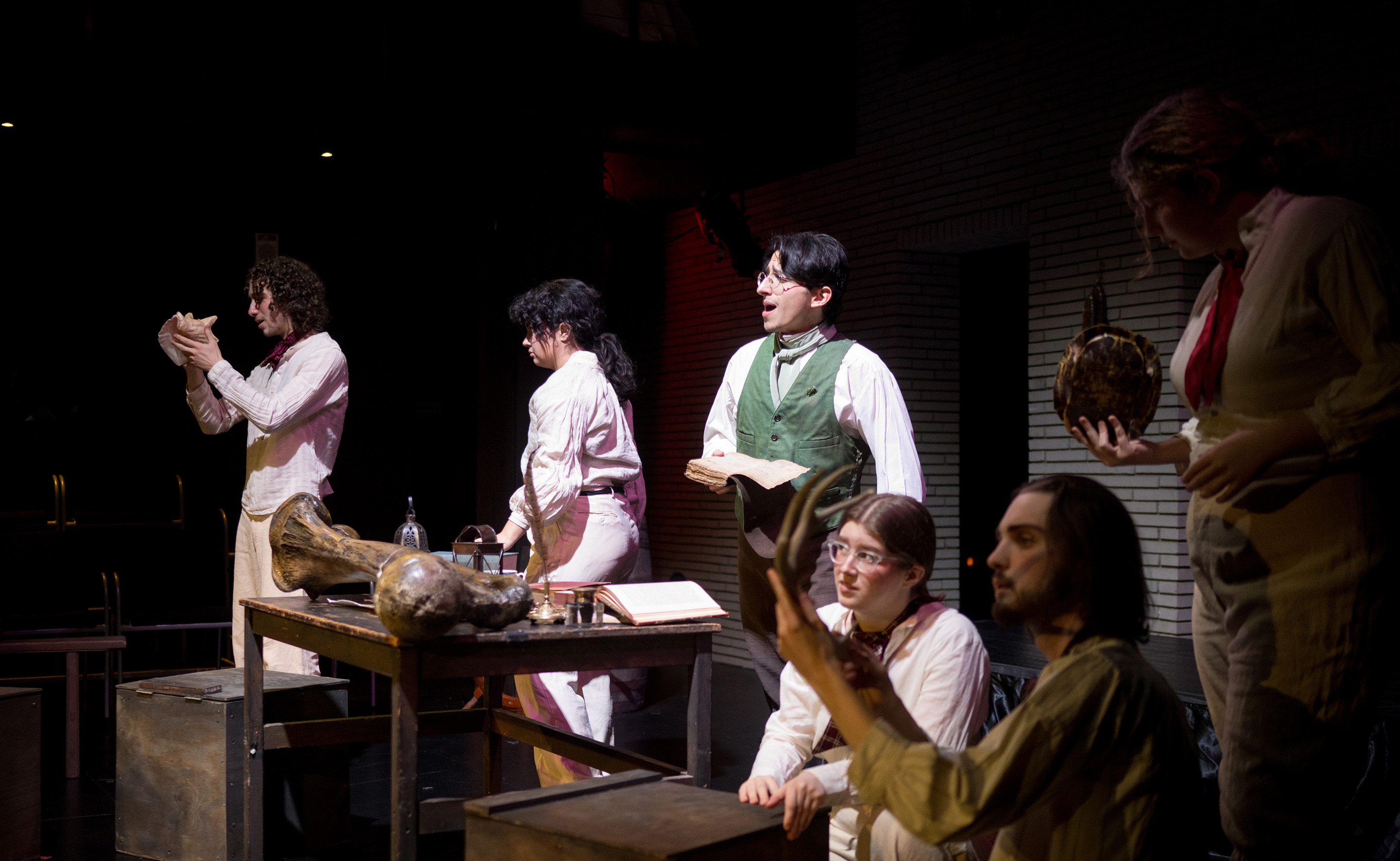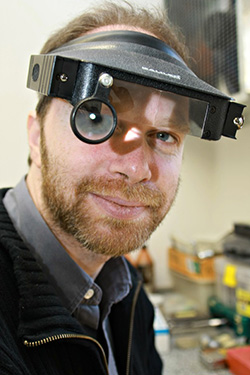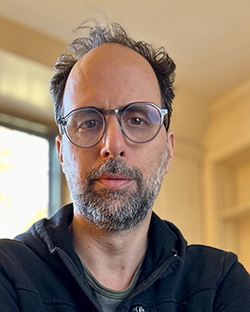“Science Storytelling” through Opera
On December 5 and 6, the opera Darwin en Patagonia made its American debut at Yale. Created by librettist Diego Golombek and composer Mariano A. Fernandez, the hour-long Spanish-language opera follows Charles Darwin and the crew of the H.M.S. Beagle on their five-year journey around the world. The piece examines Darwin’s interactions with the people and landscape of Patagonia, revealing the historical implications of his ideas about evolution.
The piece itself has “evolved”: from a spark of inspiration to a staged reading at the Centro Cultural de la Ciencia in Buenos Aires, Argentina, to a fully staged production at Yale University—made possible by a Kempf Fund grant from the MacMillan Center for International and Area Studies and by funding from Jonathan Edwards College.
The opera was directed by Abby Trejo ’27 and produced by Veronica Zimmer ’25 of Yale College. Three vocalists from the opera program at Yale School of Music were hired to sing the leads of Charles Darwin, Robert FitzRoy, and Jemmy Button, while the chorus was selected from the talented undergraduates of the Opera Theatre of Yale College. The orchestra members were recruited from various undergraduate ensembles across Yale, including the Yale Symphony Orchestra and the Yale Concert Band; they rehearsed with Maestro Alejandro Roca from the Yale School of Music and had the unique opportunity to be the first instrumentalists ever to play some of the parts. Makana Medeiros, a recent graduate of the Yale School of Music, was recruited for his expertise 0playing complex percussion parts on many different instruments.
On the heels of its successful American premiere, the MacMillan Center asked the opera’s creators Diego Golombek, an Argentine biologist and science communicator, and Mariano Fernandez, a composer trained in Argentina and France, about the development of their project and what they hope the audience gains from a fresh retelling of an epic journey.
This interview has been edited for clarity and brevity.
How did the idea for the Darwin en Patagonia project come about?
MF: It was originally Diego’s idea. The theme seemed fascinating to me—to be able to tell the initiation journey of such a relevant character in the history of mankind from such a human perspective, that journey full of discoveries and contradictions. And at the same time, to be able to talk about our land, to be able to tell a part of our history that is not always well known, such as the colonization of the native peoples of South America, from the unique perspective of a character like Orundellico, [the young Yaghan man] named Jemmy Button by his captors, was a stimulating challenge and an enormous commitment.
DG: Indeed, the young Charles Darwin is one of my personal heroes. And knowing that his passage through Patagonia was instrumental for his change of ideas regarding evolution and the origin of species was the start of an idea for this project of art and science communication. I am very interested in drama as a powerful way of science storytelling, and the prospect of telling this particular story as an opera was haunting me for several years.
How did the two of you meet and decide to work on this project together?
DG: As with most successful projects, there was some serendipity involved. Mariano and I met on a summer vacation by the beach, when he was specializing in contemporary opera. I told him I had the idea for an opera about young Darwin in Patagonia and bingo! We started working right away on the project.
MF: I knew Diego from his extensive career as a science communicator. He hadn’t heard my music, but he had seen me conduct a show for children at the Teatro Colón in Buenos Aires... When I mentioned that I was studying for a master’s degree in experimental opera, Diego told me that he had the libretto of an opera about Darwin ready to be set to music. Then I composed the first scene, and we decided to go ahead [with the project].
What is the most powerful moment in the opera for each of you?
DG: One of the most compelling subplots in the opera is the story of Jemmy Button and the other Yaghan individuals who traveled to England and back aboard the HMS Beagle. These individuals were not merely passengers; they were part of a bold, and in many ways tragic, colonial experiment. While our depiction of Jemmy in the opera is mainly fiction, both his initial presentation as “the perfect British subject” and his transformation when meeting his people [again] are very moving for me. The story is very powerful, and Mariano’s music is the best framework to spread the emotions involved.
MF: It’s not easy for me to answer that question because, as a composer, I have a microscopically detailed look at each moment, and therefore I can find various passages or fragments that for various reasons, sometimes purely musical, are particularly powerful for me. But on a scenic level and in terms of the overall narrative of the opera, the scene in which Jemmy returns to Patagonia and is reunited with his people seems to me to be perhaps the most powerful moment.
What is the opera’s message?
DG: The main message is one of several tensions: the tension between faith and doubt, tradition and innovation, the old and the new, the dynamic interplay between the conservative FitzRoy and the young and idealistic Darwin, the tension between the “civilizing” experiment with the Yagans and their true cultural identity.
What do you hope that audience members will take away with them after seeing this show?
MF: There is an aesthetic decision that has to do with the challenge of creating a complex and detailed musical language, although agile and accessible, to tell in a pleasant way this sort of ‘road movie’ of a key character in universal history that can accompany the narration without hindering it and at the same time give it depth of meaning. My idea is that the audience can enjoy a demanding and original musical experience, with influences from contemporary music as well as musical comedy, renaissance or traditional Latin American music, sifted and kneaded from my own perspective.
DG: Darwin in Patagonia is an opera that intertwines the threads of history, science, and art to tell one of the most extraordinary stories ever lived, an opera born from a shared passion for storytelling, history, and the enduring connection between science and the human experience. We seek to illuminate a transformative chapter in the life of one of history’s most revolutionary thinkers: Charles Darwin. I also hope that the audience will not only remember Darwin as an old, bald and bearded wise man but as a young and adventurous explorer.
Diego Golombek is an Argentine biologist and science communicator and popularizer. He is currently professor at the National University of Quilmes and a researcher at CONICET, the main organization dedicated to the promotion of science and technology in Argentina. Golombek is slated to be a visiting professor at the MacMillan Center’s Council on Latin American Studies in fall 2025.
Mariano Fernandez is a composer trained in Argentina and France. He works mainly as a composer of film scores, music arranger, and musical producer. For the 2024-25 academic year, he is an associate research scholar in Latin American studies at the MacMillan Center and artist-in-residence at Jonathan Edwards College.


